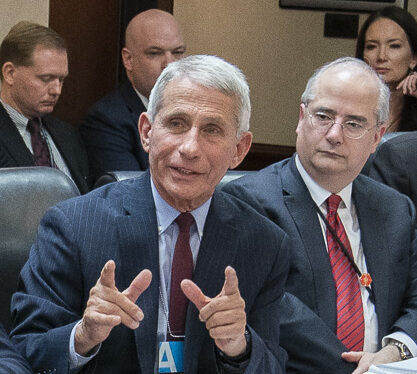Dr. Anthony Fauci, director of the National Institute of Allergy and Infectious Diseases (NIAID) and chief medical advisor to President Joe Biden, faced tough questioning from Sen. Rand Paul (R-KY) once again over third-party royalty payments from pharmaceutical companies to government scientists at the National Institutes of Health (NIH).
“We’ve been asking you, and you refuse to answer, whether anybody on the vaccine committees gets royalties from the pharmaceutical companies,’” said Paul at a U.S. Senate hearing on September 14. “I asked you last time, and what was your response? ‘We don’t have to tell you.’ When we get in charge, we’re going to change the rules, and you will have to divulge where you get your royalties from, from what companies, and if anybody on the committee has a conflict of interest, we are going to learn about it. I promise you that.”
Continuing Investigation
The grilling followed similar questioning in June when Paul asked Fauci about $194 million given to 18,000 NIH employees between 2010 and 2016.
The royalty payments were also the subject of questioning on May 13 by Rep. John Moolenaar (R-MI). NIH Acting Director Lawrence Tabak admitted the payments appear to be a conflict of interest.
“It’s the sort of thing that maybe we work together on so we can explain to you the firewalls we do have in place,” said Tabak.
Federal law allows scientists at universities and government institutions to receive royalty payments from private companies for federally funded research under the Bayh-Dole Act of 1980.
FOIA Watchdogs
The questioning on Capitol Hill began after the watchdog group Open the Books obtained documents revealing NIH scientists received $134 million in royalty payments between 2009 and 2014. Open the Books says Fauci, Francis Collins (NIH director from 2009 to 2021), and Clifford Lane (Fauci’s deputy director) are among those who have received payments. The information was received under a Freedom of Information Act (FOIA) request.
“They [the NIH] were going to give us nothing [at first],” Adam Andrzejewski, CEO, and founder of Open the Books, told the Heartland Daily Podcast on September 21. “They finally gave us heavily redacted documents, and they’re blanking out the names of the third-party payers—think pharmaceutical companies.”
Based on the $134 million, Andrzejewski believes more than $350 million in royalties were paid to NIH scientists between 2010 and 2020.
On June 1, Paul and Sens. Rick Scott (R-FL), Ron Johnson (R-WI), Josh Hawley (R-MO), and James Lankford (R-OK) sent Tabak a letter demanding the number of individual royalty payments between 2009 and 2021, the names of the recipients, and the payers. The lawmakers also asked how much money NIH received for COVID-19 testing, research treatment, and vaccination efforts.
Fauci Off the Hook?
When asked by Paul at the September 14 hearing whether the payments influenced government policy and guidance on COVID-19, particularly as regards statements about natural immunity, Fauci denied responsibility for the decisions.
“You keep saying, ‘You approve, you do this, you do that,’” Fauci testified. “The committees that give the approval are FDA, through their advisory committee. The committees that recommend are CDC, through their advisory, and you keep saying I’m the one that’s approving a vaccine.”
Andrzejewski says he does not believe that argument will get Fauci off the hook.
“NIH is hiding the royalty string, and this at its nexus, at its core, is what Dr. Rand Paul is objecting to the secrecy,” said Andrzejewski.
Another Pay Increase?
Although Fauci announced this summer he will be leaving the NIH at the end of the year, he can still be subpoenaed by Congress. Andrzejewski says he believes Fauci’s next role will be as director of the National Institutes of Health Foundation.
“Incredibly, he’ll get a pay increase, and because it’s a 501(c)(3) public charity, it is not subject to FOIA, so he is just going to shift from the director of NIAID to the foundation, an entity which is probably funded by pharmaceutical companies, so he’ll still have his finger on the scale,” said Andrzejewski.
Although the royalty payments have caught the attention of Republican legislators, Andrzejewski says this should be a bipartisan concern.
“Transparency used to be a trans-party issue,” said Andrzejewski. “Democrats and some Republicans run on transparency during the election and once they get elected they run away from the issue.”
AnneMarie Schieber (amschieber@heartland.org) is the managing editor of Health Care News.




















